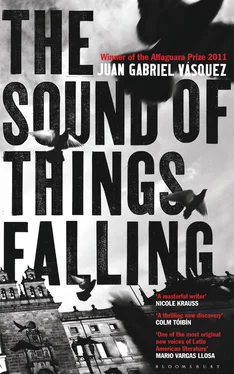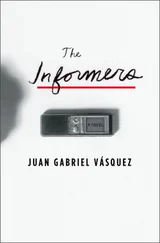When they were coming down into the Magdalena Valley and the heat burst in on them, Ricardo opened both windows and conversation was no longer possible, so they covered the last stretch to La Dorada in silence. The plains appeared on both sides, the hills like sleeping hippopotami, the grazing cows, the vultures tracing circles in the air and smelling something that Elaine neither smelled nor saw. She felt a drop of sweat, then another, slip down her side and disappear into her still-thick waist; Maya had started to sweat too, so she took off the blankets and stroked her chubby little thighs with one finger, the folds of her pale skin, and stared for a moment at those grey eyes that weren’t looking at her, or rather looked at everything with the same alarmed disregard. When she looked up again she saw a landscape she didn’t recognize. Had they passed the entrance to the town without her noticing? Did Ricardo have something to do before going home? She called to him from the back, ‘Where are we? What’s going on?’ But he didn’t answer, or he hadn’t been able to hear her questions over the noise. They had turned off the main road and were now driving through some meadows, following a track made by the passing of cars, going under trees that didn’t let the light through, driving along the edge of a property marked by fences: wooden stakes — some leaning so far over they were almost touching the ground — barbed wire that, when it was taut, served as a perch for colourful birds. ‘Where are we going?’ said Elaine. ‘The baby’s hot, I need to give her a bath.’ Then the Nissan stopped and, in the absence of a breeze, the inside of the jeep immediately felt a jolt of the tropics. ‘Ricardo?’ she said. He got out without looking at her, walked around to the other side of the jeep, opened the door. ‘Come on out,’ he said.
‘What for? Where are we, Ricardo? I have to get home, I’m thirsty, and so is the baby.’
‘Come out for a second.’
‘And I have to pee.’
‘We won’t be long,’ he said. ‘Come on out, please.’
She obeyed. Ricardo reached out a hand, but then realized Elaine had her hands full. Then he put a hand on her back (Elaine felt the sweat that was already soaking through her shirt) and led her to the edge of the track, where the fence turned into a wooden frame, a square made of thin tree trunks that served as a gate. With great difficulty Ricardo lifted the structure to make it swing open. ‘Come in,’ he said to Elaine.
‘In where?’ she asked. ‘Into this pasture?’
‘It’s not a pasture, it’s a house. It’s our house. It’s just that we haven’t built it yet.’
‘I don’t understand.’
‘There are 6 hectares, with access to the river. I’ve already paid half and I’ll pay the other half in six months. We’ll start building as soon as you know.’
‘As soon as I know what?’
‘How you want your house to be?’
Elaine tried to look as far into the distance as she could and realized only the grey shadow of the mountain range blocked the view. The land, their land, was gently sloped, and there, behind the trees, a hill began to roll gently down towards the wide valley, towards the bank of the Magdalena. ‘It can’t be,’ she said. She felt the heat on her forehead and cheeks and knew she was blushing. She looked up at the cloudless sky. She closed her eyes, took a deep breath; she felt, or thought she felt, a breeze on her face. She leaned over to Ricardo and kissed him. Briefly, because Maya had started to cry.
The new house had white walls like the midday sky and a terrace of smooth, light tiles, so clean you could see a line of ants along the edge of the wall. The construction took longer than expected, in part because Ricardo wanted to do some of it himself, in part because the land lacked services, and not even the generous bribes that Ricardo distributed left, right and centre helped the electricity cables and water pipes arrive any faster (sewage pipes were impossible, but there, so close to the river, it was easy to dig a good septic tank). Ricardo built a stable for two horses, in case Elaine wanted to go back to horseback riding in the future; he built a swimming pool and had them put in a slide for Maya, even though the little girl wasn’t even walking yet, and had them plant carreto and ceiba trees where there was no shade, and watched undaunted as the workers painted the bottoms of the palm tree trunks white, in spite of Elaine’s protests. He also built a shed 12 metres from the house, or what he called a shed despite the cement walls being as solid as the house itself, and there, in that windowless cell, in three padlocked cupboards, he kept the impenetrable bags filled with 50- and 100-dollar bills held tightly together by elastic bands. In 1973, shortly after the creation of the Drug Enforcement Agency, Ricardo had a board etched and singed with the name of the property: Villa Elena. When Elaine said that it was very nice but she had nowhere to put such a big board, Ricardo had a brick gate built with two columns covered in stucco and whitewashed and a crossbeam with clay roof tiles, and had the sign hung there by two iron chains that looked like they’d been taken off a shipwreck. Then he had them put in a green-painted wooden door the size of a man and with a well-oiled bolt. It was a useless addition, since a person could just squeeze through the barbed wire to get onto the property, but it allowed Ricardo to go on his trips with the feeling — artificial and even ridiculous — that his family was protected. ‘Protected from what?’ said Elaine. ‘What’s going to happen to us here, where everybody loves us?’ Ricardo looked at her in that paternalistic way he had that Elaine loathed and said, ‘It’s not always going to be like that.’ But Elaine realized that he meant something else, that he was also telling her something else.
A long time later, remembering them for her daughter or for herself, Elaine had to accept that the next three years, the three monotonous and routine years that followed the construction of Villa Elena, were the happiest of her life in Colombia. Taking over the land that Ricardo had bought, getting used to the idea that it was theirs, wasn’t easy: Elaine used to go out walking among the palms and sit down in a hut and drink cold juice while thinking about the course her life had taken, about the unfathomable distance between her origins and this destiny. Then she would start to walk — even in full sunlight, it didn’t bother her — towards the river, and saw the neighbouring ranches far away in the distance, the campesinos in their sandals cut from old tyres driving the cattle with shouts, each with their own voice as unmistakable as fingerprints. The couple who worked for her now had previously made their living by driving other people’s cattle. Now they cleaned the pool, kept the whole property in good shape (fixed the hinges on the doors, got rid of a spider’s nest from the baby’s room), made fish or chicken stew on the weekends. Walking through the fields, stomping hard because they’d told her it frightened away the snakes, Elaine was pleased about having worked to improve the lot of those campesinos , although she’d done so for less time than planned, and then, like a shadow, like the shadow of a low-flying vulture, it crossed her mind that she had now turned into the same kind of person who, as a Peace Corps volunteer, she’d fought against indefatigably.
The Peace Corps. Elaine got back in touch with the Bogotá office when she thought she could leave Maya in good hands and go back to work; by telephone, deputy director Valenzuela listened to her explanations, congratulated her on her new family and told her to call back in a few days, after he’d had a chance to talk to head office back in the United States, not wanting to violate protocol. When Elaine did so, Valenzuela’s secretary told Elaine that the deputy director had gone away unexpectedly and would phone her when he got back, but days passed and the call didn’t come. Elaine didn’t let that discourage her, and one day she went out herself and found the Acción Comunal people, who welcomed her as if barely a day had passed, and she started working again in a matter of hours on two new projects: a fishing cooperative and the construction of latrines. During the hours she spent with the community leaders — or with the fishermen, or drinking beer on the terraces of La Dorada, because that’s how business got done — she left Maya with her cook’s little boy, or brought her with her to work so she could play with other babies, but she didn’t tell Ricardo, who had very fixed opinions about the indiscriminate mixing of social classes. She began to use English again, so her daughter would not be deprived of her own language, and Maya would drop Spanish perfectly naturally when talking to her, going into and coming out of each of her languages as if she were going into or coming out of a game. She had turned into a lively and clever and bold little girl: she had long, narrow eyebrows and a cheekiness about her that could disarm anyone, but she also had her own world, and would go off among the carreto trees and reappear with a lizard in a glass, or completely naked having left her clothes, out of solidarity, on top of an egg. It was around that time when Ricardo, coming back from one of his trips to the Bahamas, brought her a gift of a three-banded armadillo in a cage full of fresh shit. He never explained how he’d got it, but he spent several days telling Maya the same things, obviously, that he’d been told: armadillos live in holes they dig with their own claws, armadillos roll up into a ball when they’re scared, armadillos can stay under water for more than five minutes. Maya looked at the animal with the same fascination — her mouth half open, eyebrows arched — with which she listened to her father. After seeing her get up early to feed the creature, seeing her spend hours snuggled up to him with a shy hand on the rough shell, Elaine asked, ‘So, what’s your armadillo’s name?’
Читать дальше












